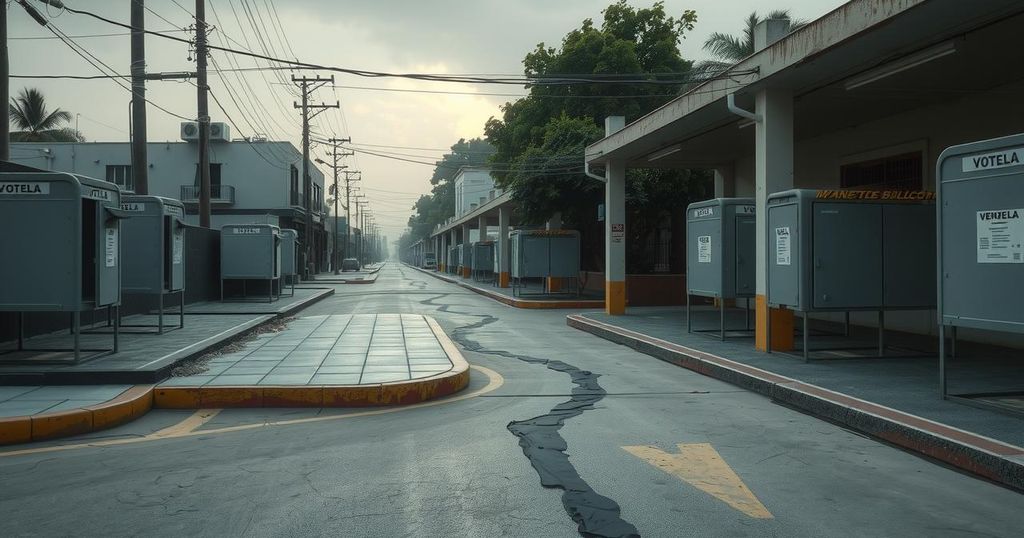Venezuela Faces Election Amid Calls for Boycott from Opposition
On Sunday, Venezuelans will vote to elect a new parliament and state governors, following a controversial election ten months prior. The opposition, spearheaded by Maria Corina Machado, is urging a boycott, branding the elections as fraudulent. Conversely, Henrique Capriles advocates for participation as an act of resistance. With heightened tensions and an economy in crisis, the outcome remains uncertain and contentious.
Venezuelans are set to head to the polls on Sunday, marking a significant moment ten months after President Nicolas Maduro secured what many called a controversial third term amidst widespread allegations of electoral fraud and violence. As the key issue remains voter participation, the situation intensifies, especially with the main opposition urging citizens not to validate what they view as another illegitimate electoral process by casting their votes.
The upcoming votes will determine a new parliament as well as 24 state governors. However, the main opposition faction, led by engineer and former MP, Maria Corina Machado, is prominently calling for a boycott, stating that participating in the elections would legitimize a farce. The sentiment among many opposition supporters reflects a deep lack of trust in the electoral process, a feeling that has only solidified after previous alleged fraudulent elections.
In contrast, a smaller opposition grouping led by Henrique Capriles, a two-time former presidential candidate, is pushing back against the boycott. Capriles suggests that abstaining from voting will only strengthen Maduro’s hold over power, instead advocating for participation as an essential act of resistance and struggle against the regime.
Tensions escalated leading up to the election as over 400,000 security personnel have been deployed to ensure voter security. In a concerning development, Juan Pablo Guanipa, an influential ally of Machado, was arrested on accusations of orchestrating a ‘terrorist network.’ He is claimed to be linked to a group of individuals detained earlier purportedly for receiving foreign funding. This situation further emphasizes the risks opposition leaders face in Venezuela.
The government, claiming threats from foreign-backed conspiracies, has cut off its border with Colombia in preparation for the election, underscoring the precarious political climate. Guanipa’s recent detention adds to a growing list of opposition figures who have faced measures from the authorities, including Edmundo Gonzalez Urrutia, whose life was threatened, forcing him into exile.
A significant decline in faith in the electoral process has defined the sentiments of many opposition supporters. Following the contentious July elections, where Maduro declared victory without presenting credible evidence, any remaining trust among voters deteriorated. The opposition’s numbers indicated Gonzalez Urrutia may have performed better, which only amplified doubts.
Compounding woes, Venezuela’s economy, once a powerhouse in Latin America, continues spiraling, impacted severely by government mismanagement and economic sanctions. Amid this backdrop, a latest move by U.S. President Donald Trump to revoke Chevron’s permission to operate in Venezuela could further cripple the regime’s dwindling oil revenues, an essential source of sustenance. Moreover, the U.S. has retracted deportation protections for numerous Venezuelans living abroad, tightening the pressure on Maduro.
This Sunday marks a pivotal moment as elections will also occur in the disputed oil-rich Essequibo region bordering Guyana, further complicating an already tense geopolitical landscape.
In conclusion, Sunday’s elections in Venezuela represent a critical juncture for the country. With the opposition faction urging a boycott and a smaller group advocating participation, the voter turnout remains uncertain. Amidst heightened tensions and arrests of opposition members, the call for legitimacy in the electoral process is resounding. Meanwhile, the economic and political crises further cloud the prospects for a favorable outcome, leaving many to question the future trajectory of Venezuela’s governance and stability.
Original Source: www.france24.com




Post Comment